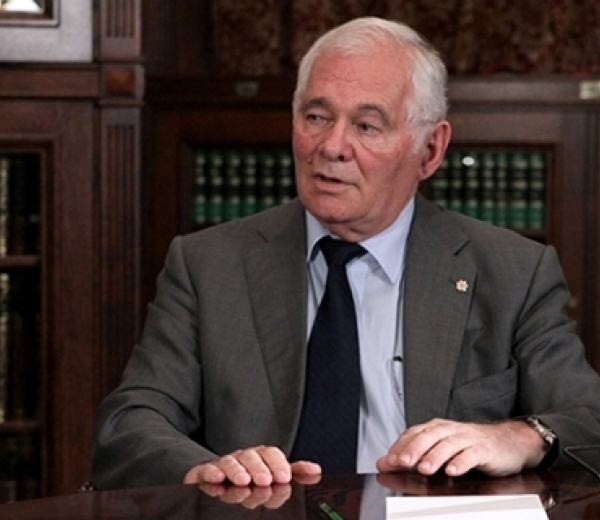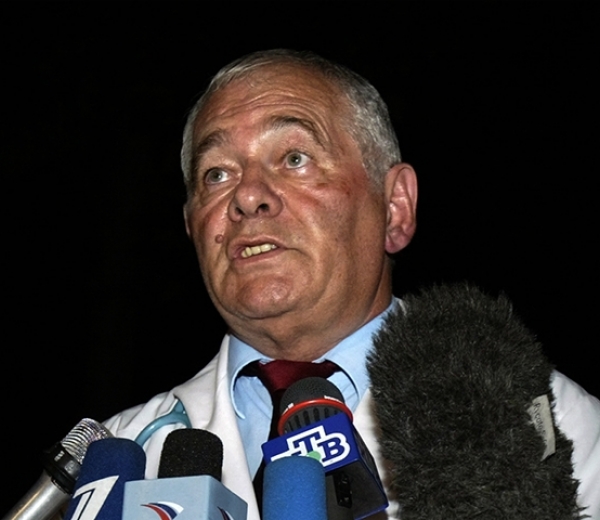Leonid Roshal: “The foundation of our team was laid in Armenia”
Dr. Roshal and his team first launched their operations in Armenia: in 1988 he helped residents of the city of Leninakan (now Gyumri) after it was partially destroyed by the Spitak earthquake. Later he used his knowledge and experience to establish a medical institute that specializes in pediatric neurological traumas. The 82-year-old surgeon’s hectic schedule barely allows time for rest, but he always finds a moment to respond to calls or Twitter messages from strangers who need help. We asked doctor Roshal about his work in disaster zones, treating both sides in a conflict and the biggest challenges he encounters.
G.M.: Your team helped many Armenian children who were caught up the Spitak earthquake. What did you learn from this experience?
L.R.: At that time the Soviet people were full of sympathy and a fervent desire to help Armenia. When I said I was going there and could only take a limited number of colleagues, many were mad at me for leaving them behind. We worked together and we worked well. This laid the foundation for the establishment of the specialized pediatric brigade consisting of surgeons, trauma specialists and emergency physicians who worked with me in Armenia. Subsequently we went to almost 20 countries that were affected by earthquakes, wars, terrorist attacks and similar disasters, but the foundations were laid in Armenia.
G.M.: The makeup of your team of physicians working in emergency zones has remained practically unchanged since 1988. What has kept your team together for so long?
L.R.: There have been changes in the team, of course. Some people have joined us, others had to leave. But the core remains the same. I like things in my life to remain constant.
G.M.: You have helped children in Nagorno-Karabakh, former Yugoslavia and the Middle East. What do people from opposing sides of the conflict say when they learn you’ve been providing medical assistance to their adversaries?
L.R.: The children’s health is what matters to us.
Nationality, religion and the political views of their parents are of no importance.
For example, India and Pakistan are not too friendly, but we’ve worked both in India and Pakistan. When the earthquakes struck, we helped both Armenia and Turkey.
During the conflict in Karabakh we worked in Yerevan and then in Karabakh, and later I flew to Azerbaijan. Unfortunately, in Azerbaijan I was detained for a short time to ascertain who I was. I was also arrested in Chechnya during the war — at Achkhoy-Martan and Urus-Martan. But here I am — alive and well.

G.M.: In 1990 you established the International Charity Fund to Help Children in Disasters and Wars. What challenges is the fund trying to overcome today?
L.R.: All of us work as volunteers and no one gets a paycheck, but with the help of this fund we buy tickets and certain medical supplies to take with us to specific countries. Unlike the Russian Emergency Ministry we have no cars or tents, nothing. We save money by taking regular flights and we cooperate with local doctors, like we did in Armenia.
G.M.: Your work has demonstrated that in emergency situations, doctors can do more than provide medical assistance. They can, for example, serve as negotiators with terrorists. What other skills are vital for doctors who work in conflict zones?
L.R.: We have seen instances when physicians come to conflict zones wishing to help, but they lack the necessary professional expertise. This was the case in Armenia. Sometimes these doctors create problems instead of alleviating them. We believe that those who go to work in disaster zones are special, spiritual people. They have to understand the pain of others and to empathize with their suffering.
G.M.: You once said that you respond to all calls for help. How do you find time for that?
L.R.: This is how I live, so it must be possible.
G.M.: What do you get from social media?
L.R.: I don’t have time for social media; the only account I have is on Twitter. It gives me an opportunity to speak my mind on different issues and to do it quickly. But more often than not, people use it to ask me for help.
G.M.: You are a proponent of free healthcare. How can this be achieved during times of socio-economic instability?
L.R.: I know that this is a burning issue in Armenia, where many hospitals were privatized. We are seeing the same trend in Russia, but I believe it’s a negative one. People are unable to pay for healthcare, and the results won’t be good. I am quite open about my support for the Soviet healthcare system. There are some hopeless situations, but the state has to find a way. Scrimping on health care is the last thing anyone should do.
G.M.: You have set an example for many people around the world, but who was your most influential teacher? Who taught you the principles that you adhere to?
L.R.: That’s a simple answer — it was life itself.

